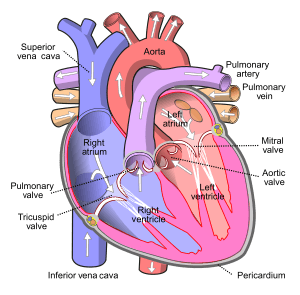Pulmonary artery facts for kids
The pulmonary artery is a special blood vessel that connects your heart to your lungs. It's unique because, unlike most arteries that carry oxygen-rich blood, the pulmonary artery carries blood that doesn't have much oxygen.
Here's how it works: Blood from all over your body goes into the right side of your heart. From there, your heart pumps this blood into the pulmonary artery. This artery then takes the blood to tiny blood vessels called capillaries in your lungs. In the lungs, the blood picks up oxygen. Once it's full of oxygen, this fresh blood travels back to the left side of your heart through the pulmonary vein. Finally, your heart pumps this oxygen-rich blood out to the rest of your body!
What is the Pulmonary Artery?
The pulmonary artery is a large blood vessel that starts at the bottom right chamber of your heart, called the right ventricle. It's like the main highway for blood leaving the heart on its way to the lungs. This artery is located near the front and left side of your heart. Its main job is to carry blood that has already delivered its oxygen to the body and now needs to pick up more.
How the Pulmonary Artery Branches
After leaving the heart, the main pulmonary artery goes up a little and then splits into two main branches. Think of it like a tree trunk splitting into two big branches:
- The right pulmonary artery goes to your right lung.
- The left pulmonary artery goes to your left lung.
These branches then divide into even smaller vessels inside each lung, reaching all the tiny air sacs where oxygen exchange happens.
Images for kids
-
This image shows how the main pulmonary artery is positioned near other important body parts like the aortic root and trachea.
-
A CT scan of a normal lung, highlighting different levels of the pulmonary arteries.
See also
 In Spanish: Tronco pulmonar para niños
In Spanish: Tronco pulmonar para niños
 | James Van Der Zee |
 | Alma Thomas |
 | Ellis Wilson |
 | Margaret Taylor-Burroughs |








